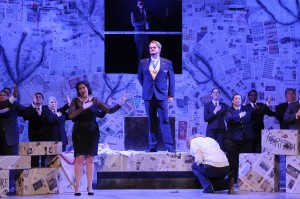“I must win the loyalty of my people through love,” sings the beneficent Tito in Act Two of Mozart’s rarely performed opera La Clemenza di Tito. Opera in the Heights bravely took on this neglected late opera and performed it with heart, reminding me that it had been one of Mozart’s most popular operas until about 1830, and perhaps it should be again.
It is another rarity when a sovereign rewards honesty with amnesty, even when a subject confesses to plotting his assassination. And as such, La Clemenza is a plot that relies on the ensemble numbers that are so celebrated in Mozart’s other operas. Watching the Emerald cast—a passionate collection of talented young singers—it was clear they had taken great care of the trios, the quartets, and the chorus numbers.
The early chorus march “Serbate, o dei custodi” led by tenor Zach Averyt in the role of Tito, was full and lively. The fiery trio “Vengo! Aspettate!” between Justin Hopkins, Jennifer Crippen, and Celeste Fraser (which comes when Publio and Annio tell a shocked Vitellia that Tito wants her as a consort) rang together with attention to the harmonic subtleties while also communicating Vitellia’s veiled despair.
Hopkins, a bass-baritone whose full, light timbre as Leporello stole the show in OH’s production of Don Giovanni last season, was a stand out again. Making her OH debut as Sesto, mezzo soprano Vera Savage left an impression vocally and otherwise. The victim of Vittellia’s seduction, Sesto is a desperate man. Sure, we’ve seen trouser roles before—when a female singer dons the character of a man—but have we seen a woman in a trouser role slowly strip off her suit and tie in an act of frustrated passion to stand confidently in only underwear? Savage pulled it off with panache.
Stage director Keturah Stickann has done exceptional work with the Lambert Hall stage. The blocking was smart, never feeling overcrowded, and the window cut-out at center stage proved a visual treat. The stage, papered from floor to ceiling with newspapers and charcoal pitchforks, bespoke a timely present-day obsession with gossip and misconceptions. The costumes designed by Dena Scheh—sharp suits set against decadent gowns—were tasteful and divinely popped against the newspaper background.
The orchestra, under the new direction of interim conductor Eiki Isomura, was reliably solid. Even so, there were a handful of unfortunate moments when the singers lagged behind the orchestra. Isomura notes in the program that initially he felt intimidated by La Clemenza. While he seems in many ways to have conquered this (a triumphant downbeat to the overture surely testified as such), overall he directed with a slight awkwardness, as though he were still getting to know the score and his musicians.
It’s not often that opera celebrates the deep virtues of forgiveness, generosity, and love, where the opera ends with a chorus of loyal subjects asking the gods to grant their sovereign a long life. More regularly, audiences are confronted with prolonged death, lingering deceptions, and questionable moral codes that no doubt delight us (Don Giovanni, for example), but are nevertheless commonplace in the genre. Here, we are left with a uniquely comforitng blanket absolution thanks to the zeal of OH’s cast and the warm familiarity of Lambert Hall.


Sounds like a pretty neat production, gossip and misconceptions is about right. Cheers for the review 🙂
Dear Mr. Wyeth,
I agree with you for the most part but you are absolutely incorrect about your comment:
“Duets written for a tenor and a soprano performed by two sopranos.”
It was absolutely NOT written for a tenor and soprano but rather for a soprano and mezzo peformed as a pants role and originally for a castrati (which thankfully is no longer a tradition). If you have ever seen a Mozart, Strauss, or Handel opera you will be familiar with these roles. It is VERY common.
Here is a website that may help you understand this:
http://pantsroles.weebly.com/history-of-pants-roles.html
NO Mozart opera performed in the world in the last 100 years has had a man playing these roles with the exception of the occasional countertenor (modern day castrati that are of course not actually castrated but have that range).
Hopefully this educated you.
Pitchforks? Is that what those wiggly streaks were? In fact were we at the same performance? The hall was half empty for the second half. I could not fault the performers. They did as directed. However, listening to duets written for a tenor and a soprano performed by two sopranos was, well not satisfying. I could go on, but I am afraid the changes to OH may be fatal.